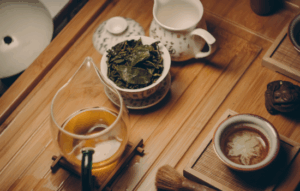Advertisements
Neurodegenerative diseases, such as Alzheimer's and Parkinson's, affect millions of people worldwide, causing significant impairments to their quality of life. Fortunately, nature offers us complementary alternatives to help protect neurons and improve cerebral circulation.
In this article, we'll explore the benefits of green tea, ginkgo biloba tea, and turmeric tea in the context of these conditions. If you're between 45 and 65 years old or know someone in this age range, this article is for you! Get ready to understand in a simple and clear way how these infusions can support brain health.
Advertisements
Why Focus on Neurodegenerative Diseases?
Neurodegenerative diseases are conditions that cause the progressive deterioration of neurons. Among the most common are Alzheimer's and Parkinson's, which can cause memory problems, movement difficulties, and behavioral changes.
Although modern medicine offers treatments that slow the progression of these conditions, the use of medicinal teas has gained prominence as a complement to improving quality of life.
Advertisements
See also
- Reveal Wi-Fi Passwords with “Show Wi-Fi Password”
- Learn English Quickly
- GPS App: Your Navigation Companion in the Digital Age
- Learn to Play Guitar at Home
- Improve your cell phone's battery
- Detox Tea: The Secret to Improving Your Vitality
Today we'll talk about three teas with unique properties that can be allies in brain care: Green Tea, Ginkgo Biloba Tea, and Turmeric Tea. In addition to being delicious and aromatic, they are rich in substances that help protect neurons, improve cerebral circulation, and have anti-inflammatory effects.
Green Tea: The Guardian of Antioxidants
What is Green Tea?
Green tea is one of the oldest and most appreciated beverages in various cultures, especially in Asia. It is prepared from the leaves of the plant. Camellia sinensis and undergoes a minimal fermentation process, which preserves its natural properties. This beverage has become popular not only for its refreshing taste but also for its numerous health benefits.
Benefits of Green Tea for the Brain
One of the main virtues of green tea is its high content of antioxidants, such as catechins. These compounds help fight free radicals, which are unstable molecules that can cause damage to the body's cells, including neurons. By reducing oxidative stress, green tea protects brain cells and contributes to better brain health.
- Protection of Neurons: The antioxidants present in green tea act to defend neurons, preventing cellular degeneration associated with Alzheimer's and Parkinson's.
- Improved Cognitive Function: Studies indicate that regular consumption of green tea can improve memory and concentration, making it an important ally in keeping the brain active and healthy.
How to Include Green Tea in Your Routine
To reap the benefits of green tea, it's important to drink it regularly, but not excessively. Ideally, you should prepare one cup (around 200 ml) a day, without adding excess sugar or artificial sweeteners. You can:
- Drink it alone, appreciating its smooth and slightly bitter flavor.
- Mix it with other herbs, such as mint or ginger, to vary the flavor.
- Use it as a base for smoothies and other natural drinks.
Ginkgo Biloba Tea: The Natural Stimulant of Cerebral Circulation
Getting to know Ginkgo Biloba
Ginkgo biloba is one of the oldest trees on the planet, known for its resilience and longevity. The leaves of this tree have been used in traditional Chinese medicine for centuries and are renowned for their beneficial effects on blood circulation. Ginkgo biloba tea, prepared from these leaves, is valued for its ability to improve cerebral circulation.
Impacts of Ginkgo Biloba Tea on Brain Health
Good cerebral circulation is essential for the brain to receive the nutrients and oxygen it needs to function properly. Ginkgo Biloba Tea can help with this process in several ways:
- Improved Circulation: By dilating blood vessels, Ginkgo Biloba facilitates blood flow to the brain, which can help improve memory and cognitive function.
- Antioxidant Action: Like Green Tea, Ginkgo Biloba has antioxidant properties, helping to protect neurons against oxidative stress.
- Reduction of Symptoms of Neurodegenerative Diseases: Some studies suggest that regular consumption of Ginkgo Biloba may help reduce symptoms associated with Alzheimer's and Parkinson's, although it's important to remember that it's not a substitute for conventional medical treatment.
Tips for Consuming Ginkgo Biloba Tea
Ginkgo Biloba Tea can be easily included in your daily routine:
- Prepare the infusion with dried leaves or specific Ginkgo Biloba tea bags.
- Avoid consuming it in excess, as very high doses can cause adverse effects.
- Combine it with a nutrient-rich diet to enhance its benefits for the brain.
Turmeric Tea: The Powerful Natural Anti-inflammatory
What is Turmeric?
Turmeric is a yellow spice widely used in cooking, especially in India, where it is known as "saffron of the earth." In addition to adding color and flavor to dishes, turmeric is famous for its anti-inflammatory and antioxidant properties. Turmeric tea is a convenient and tasty way to take advantage of these benefits.
Anti-inflammatory Properties and Brain Protection
Chronic inflammation is linked to various diseases, including neurodegenerative diseases. Turmeric tea significantly reduces inflammation in the body and protects the brain:
- Fight Inflammation: Curcumin, the main active ingredient in turmeric, is a powerful natural anti-inflammatory. It helps reduce inflammation in the brain, which may be linked to the progression of Alzheimer's and Parkinson's diseases.
- Cellular Protection: The antioxidant action of curcumin helps protect neurons from damage caused by free radicals.
- Improving Cognitive Health: Some studies suggest that curcumin can improve memory and delay cognitive decline, contributing to a better quality of life in older adults.
How to Prepare and Consume Turmeric Tea
To take advantage of the benefits of Turmeric Tea, follow these tips:
- Use turmeric powder or fresh root to prepare the infusion.
- Add a pinch of black pepper, as it increases the absorption of curcumin by the body.
- Mix with honey or lemon to enhance the flavor and enhance the benefits.
- Consume it daily, but without exaggeration, to avoid possible gastrointestinal discomfort.





One Response